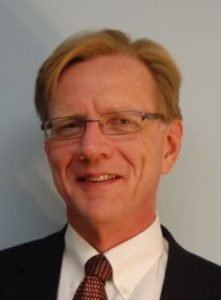Fun and accreditation do not usually appear in the same sentence together. But they should.
When it’s fun, you know it’s working.
In this episode, Dr. Amy Dykens, CEO of Weave, speaks with Dr. Mark LaCelle-Peterson, Founding Team Member and President at Association for Advancing Quality in Educator Preparation (AAQEP), about how his programs bring fun back to accreditation — and shape the conversation about pedagogy.
Join us as we discuss:
- Strategies that energize colleges about their successes
- 4 performance standards for professional educators
- Building a community of cohorts around participation
- Re-envisioning accreditation as cyclical learning and improvement
- A philosophy of pedagogy focused on student paths to success
Let’s get energized by accreditation again.
“We do try to put the fun back into accreditation. People are coming out of workshops saying they feel energized by accreditation.” — Dr. Mark LaCelle-Peterson
Having Fun With Accreditation
Mark starts his workshops with a question: What is it that makes you proud of your program’s completers? Why are you proud?
His next question is: What’s the best evidence you have to justify that pride?
According to Mark, many folks are proud of what they’re doing. There’s good quality programming for them to bring forward. Of course, there’s also plenty of room for improvement. But when you start the conversation about making good work better, it’s a more fun dialogue.
Everybody likes to talk about the positive things they are doing. It’s fun. It’s energizing. It gives them a reason to go home and dig back into their work. Strange as it might sound, Mark’s mission is to put the fun back into accreditation.
Someone asked him, “How are you going to know if what you’re doing is working?”
He answered, “Most of the time, it feels like we’re having fun. It’s also work. There’s plenty of work involved. But it’s good work.”
“Professional, programmatic accreditors working with professional programs have a real advantage because we have clear performance expectations for our fields.” — Dr. Mark LaCelle-Peterson
Where’s your evidence?
The generic term for accreditation is really just quality assurance. If you’re going to have to assure anyone of anything, it’s almost always going to be quality.
Therefore, quality is what our conversations have to be about.
Ask yourself:
- What are we doing?
- How can we do more of that?
- How can we improve it?
Then, start looking for the evidence. Assurance requires evidence. Could you prove to anyone — other than your mother — that you offer the quality programming you say you do?
Of course your colleagues agree. They want to believe the same thing you do. But what do employers say about your candidates? Will they hire them? What kind of positive ratings do your candidates get? Can you list off the reasons an employer should hire anyone who has come through your program?
When you know those things, accreditation gets really exciting!
“The conversation about taking our good work and making it better can be a fun conversation because it’s about the positive things that we do.” — Dr. Mark LaCelle-Peterson
Standards: the ceiling or the floor of quality assurance?
If you’re not careful, accreditation standards will become a ceiling on quality instead of your floor. They’re going to define things so well that you never soar above them. You don’t grow anywhere.
It’s time to stop accepting just what you know today and start looking for new and innovative things to be engaged in.
At AAQEP, Mark wanted the standards to reflect the fact that educator preparation is a mature field with a solid research base behind it. At the same time, educator preparation is a dynamic field that has to do its work in very specific contexts where the needs of families, students, communities, and schools are different from one another. Consequently, he wanted the standards to have an open dimension, too.
Measures and Predictions
“We’ve got some wonderful measures that give us performance information — none of them perfect,” Mark told us. “There’s no perfect measure. There’s no perfect system.”
Nevertheless, we can gather evidence. We can talk about ratings, and we can talk about the substance of the evidence being linked to agreed-upon standards, whether at the state or at the national level.
That makes it interesting work, and you truly can say, “Yes, these performances really do represent what it is that we hope a professional educator will be able to do when they start.”
The accreditor can follow up and say, “Are they actually doing it?”
And you can say yes! with certainty.
That’s what makes accreditation exciting!
“To have an open conversation about pedagogy, the basis for it, and the impact of it would be absolutely welcome.” — Dr. Mark LaCelle-Peterson
A Conceptual Framework for Educator Preparation
Educator preparation is dynamic, so the standards have to be open and flexible.
A 2×2 Table
AAQEP uses four standards of quality that fall neatly into a small 2×2 grid.
The X-Axis
The two standards on the X-axis of the grid are:
- Completer performance (outcomes)
- Program practice (processes)
The Y Axis
The two standards on the Y-axis of the grid are:
- Foundational expectations (content)
- Contextual challenges (context)
But is it fun? Actually, yes!
Energy & Positivity
Nothing quite equals the excitement of measuring educator success and laying out a plan for even further improvement.
Check out these resources we mentioned during the podcast:
- Marilyn Cochran-Smith and her book Reclaiming Accountability in Teacher Education
- Improvement in Action: Advancing Quality in America’s Schools (Continuous Improvement in Education Series) by Anthony S. Bryk
- AAQEP Standards & Guide
- Ep. 2 w/ Linda Suskie
This conversation with Mark LaCelle-Peterson is taken from an episode of Accreditation Conversations.
Keep connected with us by subscribing to Accreditation Conversations on Apple Podcasts, Spotify, or your favorite podcast player. Check out our website here.



